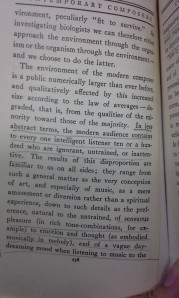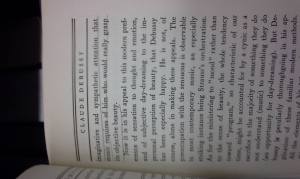The late 1700’s was a very well-known time for musicians, such as Ludwig Beethoven. Often, I had found that a majority of the books with musical compilations had told of the years that the music was published, not the book itself. Within the book “Contemporary Composers” by Daniel Gregory Mason (published by The Macmillan company in 1918), it shows multiple moments where someone has underlined certain points.
 (Pg. 138)
(Pg. 138)
In the first portion of the underlined section the person who had underlined the text made a point to take notice of what was written there. This section mentions how even though a musician knows what they are playing, an “untrained” listener, or a listener who is not so widely educated in the ways of music, will not know exactly how in depth the music goes. As a musician, I have found this to be true in multiple forms, and often forget that the audience does not truly understand the music. Knowing exactly the extent of the audience’s listening and comprehending abilities can help the musician to alter their performance in such a way that the audience will be as close to the same level as the performer.
 (Pg. 139)
(Pg. 139)
Continued from the pervious page to the top of page 139, the underlined section also goes on to talk about how music is not just about playing the notes correctly and with the right inflections, but the emotions that are laced into the notes. The composer does not create these emotions entirely; that is entirely to the performer. A good performer can change a song that is typically known as a slow and beautiful piece, to music that is riddled with fear and despair. The composer is a guide, the performer is the leader.